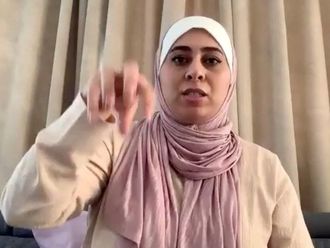Mahmour: The streets of this front-line town bear the scars of combat: The shops are closed or destroyed and most of the homes are abandoned, some still covered in graffiti scrawled by fighters from the Islamic State of Iraq and the Levant (Isil).
Nearly a week after US airstrikes paved the way for Kurdish forces to reclaim this once bustling enclave from Isil militants, very few people have returned. Residents know that just a few miles south the extremists still lurk.
“No one will come back until Isil are gone,” said one tired business owner. The man moved to Arbil, the capital of Kurdistan, after the Kurdish militia, known as the peshmerga, lost control of Mahmour earlier this month.
“No one trusts the peshmerga anymore,” he added. “They told us they would defend us, and then they fled.”
Recent efforts by the peshmerga have done little to lift the former residents’ spirits. A giant trench that faces the militant fighters’ current positions, along with a perimeter of Kurdish fighters placed around Mahmour, are reminders of the threat that Isil still poses to Iraq’s Kurdish minority. Mahmour is about 95km from Arbil.
Few people, including those in the peshmerga, have faith that they could withstand another assault by Isil without more military assistance from Western governments.
“We cannot face them, because we will lose many men,” said Farman Farhad, a commander whose Kurdish fighters patrol the area south of Mahmour. Citing the heavy weapons that the militants have plundered from the Iraqi army, he added. “We don’t have the proper equipment.”
A small contingent of peshmerga fighters on the southern edge of Mahmour, a sunbaked stretch of brown desert, complained bitterly that the militants’ plunder had put them at an extreme disadvantage.
“They have better weapons from the Iraqi army,” Farhad said.
In recent days, he said, Isil militants had fired mortars at their position and had deployed a sniper to fire at units patrolling between the two front lines. Scanning the horizon, he pointed to a cluster of buildings in a Sunni village just a few miles away that he said was supporting the militants.
The few residents who have returned to Mahmour believe that some of their Arab neighbours, along with people in Arab villages on the outskirts of town, aided Isil in gaining control so quickly.
“There are some with Isil and others with us,” said Saman Yousuf, a Kurd who brought his family back to town this week. “They got information from people and shared it.”
A group of men standing near the centre of Mahmour also shared the suspicion that some, though by no means all, of their Arab neighbours had betrayed them by helping the militants.
“We will see which ones move back into the town,” said a cabdriver, who had moved his family to Arbil.
Yousuf said 40 people were now living in his home. Bullet holes had punctured its unpainted concrete facade, which he proudly showed to visitors.
He said that he had sent his children to Arbil when the fighting began, and that he and his wife armed themselves and hid in the neighbouring mountains, hoping to defend Mahmour. They returned home after the US airstrikes helped force Isil forces from town, having resigned themselves to the fact that they had nowhere else to go.
“We are the first family to come back,” he said, as his children played video games on a television run by a generator. “This is our land and our home — we have nowhere else to go. We built it ourselves.”
Despite the grim environment outside, the Yousuf home was relatively lively. Children ran through the living room, carting their parents’ assault rifles and a set of body armour. Yousuf’s brother, a police officer, and his family had moved in. Women brought trays of rice and chicken, along with bowls of tomato stew, into the spacious living room.
“We are trying to encourage others to return as well,” Yusuf said. “but they are afraid. Some won’t even come back for their furniture.”
Though he is hoping to serve as an anchor in the neighbourhood, Yousuf acknowledged that there were no shortage of pitfalls to returning so soon. A rocket destroyed his car, reducing it to a blackened husk. Without water, the family must travel to a nearby farm to drink and wash. For chicken, Yousuf said, he has to approach Isil territory.
Concerned that he may not be able to count on the peshmerga, he is determined to be self-sufficient. His children, the oldest of whom is a teenager, all know how to fire a weapon. So do the women. The family keeps armed guards on the roof each night, in case Isil militants return. Though he worries about his children growing up accustomed to such violence, he accepts it with equanimity, having little recourse.
“What choice do I have?” he asked.
— New York Times News Service












